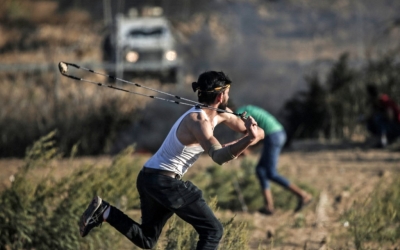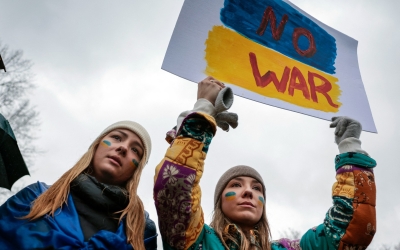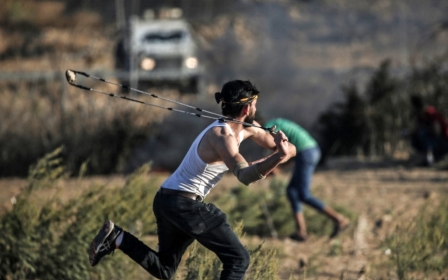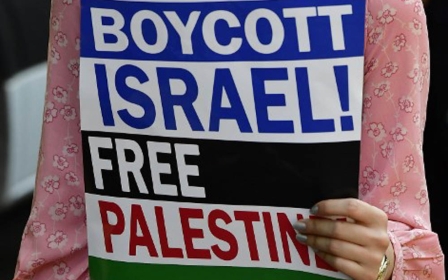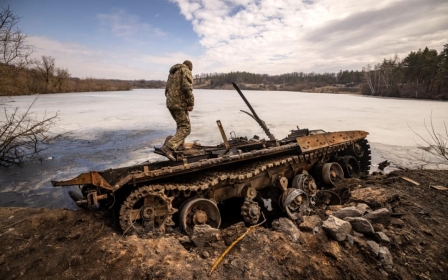'Yemeni mothers are mothers, too': US activists question Jill Biden's trip to Ukraine
US activists have reacted with surprise to first lady Jill Biden's visit to Ukraine, questioning why such initiatives haven't been undertaken for victims from other war-torn countries, including Syria and Yemen.
Biden travelled under the cloak of secrecy to Ukraine on Sunday, becoming the latest high-profile American to enter the country during its 10-week-old conflict with Russia.
"I wanted to come on Mother's Day," Biden told Ukrainian first lady Olena Zelenska. "I thought it was important to show the Ukrainian people that this war has to stop and this war has been brutal and that the people of the United States stand with the people of Ukraine."
According to The New York Times, Biden also travelled to Slovakia where she visited a refugee centre to console Ukrainian mothers and children.
US activists and academics told Middle East Eye that while it was a great initiative for Biden to visit the war-ravaged country, the White House should also show the same energy to victims of other conflicts.
"I feel like this is another act of racism by the US government," said Neda Saleh, a Yemeni activist and coordinator at Action Corps.
"Yemeni mothers are the same as other mothers invaded by foreign powers.
"They're all suffering from war and suffering from the displacement of their children. It just feels very racist and backhanded."
Yemen, which has been gripped by conflict since 2014, has lost hundreds of thousands to violence, hunger and disease.
According to the UN, some 24.1 million people - around 80 percent of the population - rely on humanitarian aid and protection to survive, while 58 percent of the population lives in extreme poverty.
Saleh said it was crucial that the Biden White House shine a light on the seven-year Yemen conflict, saying there appeared to be a greater public acceptance of Ukrainian refugees, which was a comparatively new war.
"They [Ukrainians] are not painted as violent rebels like we are in Yemen or Syria," she said.
'Done for show'
According to Zaher Sahloul, the president of MedGlobal, an organisation that provides health care in disaster regions, "there is a double standard and underlying racism when dealing with the Ukrainian crisis and the wars in Syria or Yemen".
A few weeks after Russia launched its invasion, Biden announced the US would accept up to 100,000 Ukrainian refugees and his administration would donate $1bn to assist European countries facing an influx of refugees on their borders.
Neither first lady Michelle Obama nor Melania Trump visited Syrian refugee camps, despite the crisis remaining the largest displacement of people globally.
"I don't think that the attitude of the American administration towards the Syrian or Yemeni crisis will change as long as they are contained in the 'Middle East'," Sahloul said.
"It is the same attitude of the Obama administration and reflects the same team of national security advisors who surrounded Obama and now surround Biden. When it comes to policies toward Middle Eastern crises, there is no moral consistency."
According to Robin Kirk, the faculty co-chair of the Duke Human Rights Center at Duke University, while Biden's visit to Ukraine "was done for show", this is how you change people's opinions.
"If things are happening off-screen or in the dark, they can't be shown to people to illuminate the very real stakes involved here. I wish the first lady could go to Yemen. I wish that she could go to Syria… I wish she'd go to Burma and hang out with the Rohingya Muslims there because they really need this kind of attention and support… I wish she could go into the Palestinian refugee camps and really highlight the plight of the Palestinian people there. All of these things are clear humanitarian issues."
Kirk explained that going to war-torn countries and visiting refugees isn't easy for many reasons that include both security and the "right group" to support.
"I think that in both Syria and Yemen, there are real complications with who is the obvious kind of bearer of future stability in the region. Some situations are just too complicated or too muddy," Kirk said.
"It's a huge political gamble to put symbolically, as well as physically, to put people in a situation like this. You don't want to have that symbolism, then be hijacked by groups or entities that are themselves committing humanitarian atrocities or that are themselves compromised with corruption."
"So this is, this is not the kind of tool - I hate to speak of it that way - but it's not the kind of tool that is available for every conflict."
Middle East Eye delivers independent and unrivalled coverage and analysis of the Middle East, North Africa and beyond. To learn more about republishing this content and the associated fees, please fill out this form. More about MEE can be found here.


